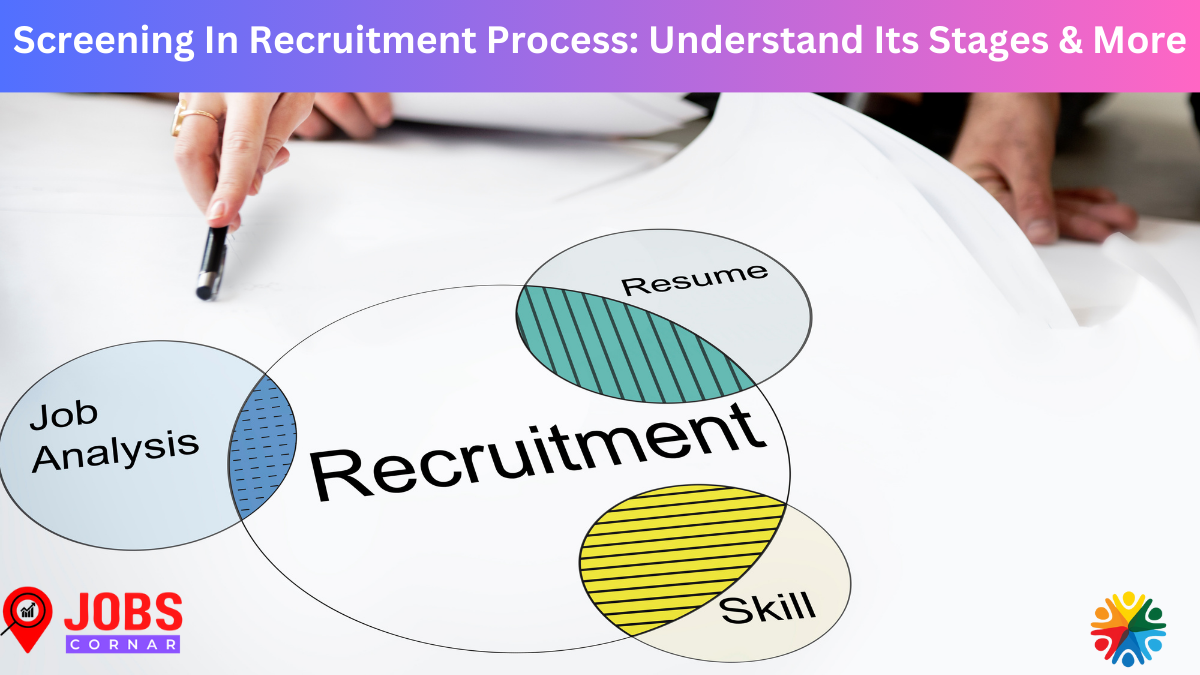Screening In Recruitment Process: Understand Its Stages & More. Are you in the business of hiring top talent? Do you want to ensure that your recruitment process is efficient and effective, and ultimately leads to the best hires? If so, understanding the screening in recruitment is essential. In this comprehensive guide, we’ll delve into the various aspects of screening in recruitment, including its stages, methods, and key metrics for evaluation. By the end of this article, you’ll have a solid grasp of how to optimize your screening process to make the best hires for your organization.
Introduction
Recruitment is a critical function for any organization. It’s not just about finding candidates; it’s about finding the right candidates for the right place. This is where screening in recruitment plays a pivotal role. It’s the process of evaluating and assessing potential candidates to determine if they meet the criteria for a specific job role. Let’s explore the various stages of screening in recruitment.
Stages of Screening In Recruitment
Stage 1: Defining a Screening Criteria
The first step in screening is to clearly define the criteria that candidates must meet to be considered for a position. This includes qualifications, skills, experience, and any other relevant factors. A well-defined screening criteria is the foundation of an effective recruitment process.
Stage 2: Communicating the Screening Criteria
Once the screening criteria are established, it’s crucial to communicate these criteria to all stakeholders involved in the hiring process. This ensures that everyone is on the same page and knows what to look for in potential candidates.
Stage 3: Pre-Screening
Pre-screening involves a preliminary review of resumes and applications to identify candidates who meet the basic requirements. This step helps in narrowing down the pool of applicants and saves time in the subsequent stages.
Stage 4: Initial Screening & Assessment
At this stage, candidates undergo a more in-depth evaluation. This may involve interviews, skills assessments, or other forms of testing to determine if they have the necessary qualifications and attributes for the job.
Stage 5: Background and Reference Check
Before making a final decision, it’s essential to conduct background checks and contact references provided by the candidates. This helps in verifying the accuracy of the information provided and ensures the candidates have a history of reliability and integrity.

Screening Techniques in Recruitment
Resume & Cover Letter Screening
Reviewing resumes and cover letters is a common initial screening technique. It helps assess a candidate’s qualifications, experience, and communication skills.
Skills Tests
Skills tests are used to evaluate a candidate’s specific abilities related to the job, such as technical skills, problem-solving, or creativity.
Phone Screening
A phone interview allows recruiters to get a sense of a candidate’s personality, communication skills, and interest in the position.
Video Screening
Video interviews have become increasingly popular, especially for remote roles. They provide a more comprehensive view of a candidate’s presentation and communication skills.
Work Assignment
In some cases, candidates may be given a real or simulated work assignment to assess their practical skills and problem-solving abilities.
Social Media Screening
Recruiters may also check a candidate’s social media profiles to gain insights into their character, values, and professional reputation.
Verifications
Verifying a candidate’s credentials, such as educational degrees and professional certifications, is a critical step to ensure accuracy.
Metrics to Evaluate Screening in Recruitment
To measure the effectiveness of your screening process, consider these key metrics:
Quality of Hire
This metric evaluates how well a candidate performs in their role after being hired. It reflects the accuracy of your screening process in identifying top talent.
Time to Hire/Time To Fill
How long does it take from posting a job opening to making a hire? A shorter time to hire indicates an efficient recruitment process for the company.
Candidate Experience
The candidate’s experience throughout the recruitment process is vital. Positive experiences can enhance your employer’s brand and attract top talent.
Things to Keep in Mind During the Screening of the Recruitment Process:
Here are some essential considerations for a successful screening process:
- Use a Structured Method: Having a standardized screening process ensures fairness and consistency.
- Be Consistent: Apply the same criteria to all candidates to avoid bias and discrimination.
- Transparency is Important: Communicate clearly with candidates about the screening process and expectations.
- Keep Record: Maintain thorough records of the screening process for future reference and compliance purposes.
FAQs
Q: What is the primary goal of screening in recruitment?
The primary goal of screening in recruitment is to identify and select candidates who meet the criteria for a specific job role, ensuring that only the most qualified individuals proceed to the next stages of the hiring process.
Q: How can I create effective screening criteria for a job opening?
To create effective screening criteria, start by identifying the essential qualifications, skills, and experience required for the position. Consult with hiring managers and key stakeholders to ensure consensus on the criteria.
Q: What are the benefits of using skills tests in the screening process?
Skills tests help assess a candidate’s practical abilities and determine if they possess the necessary skills to excel in the role. They provide valuable insights into a candidate’s capabilities beyond what a resume can convey.
Q: Is social media screening ethical in recruitment?
Social media screening can be ethical if conducted transparently and without invading a candidate’s privacy. It should focus on job-related information and avoid discriminatory practices.
Q: How can I improve the candidate experience during screening?
To enhance the candidate experience, communicate clearly, provide feedback, and maintain a respectful and professional approach throughout the screening process.
Q: What is the significance of keeping records in the screening process?
Keeping records is essential for legal and compliance purposes. It ensures transparency, accountability, and the ability to address any disputes or discrepancies that may arise.
Conclusion
Effective screening in recruitment is a cornerstone of successful hiring. By following the stages, techniques, and best practices outlined in this article, you can optimize your screening process and make well-informed hiring decisions. Remember to measure your results using key metrics and continually refine your approach to attract and retain top talent.





